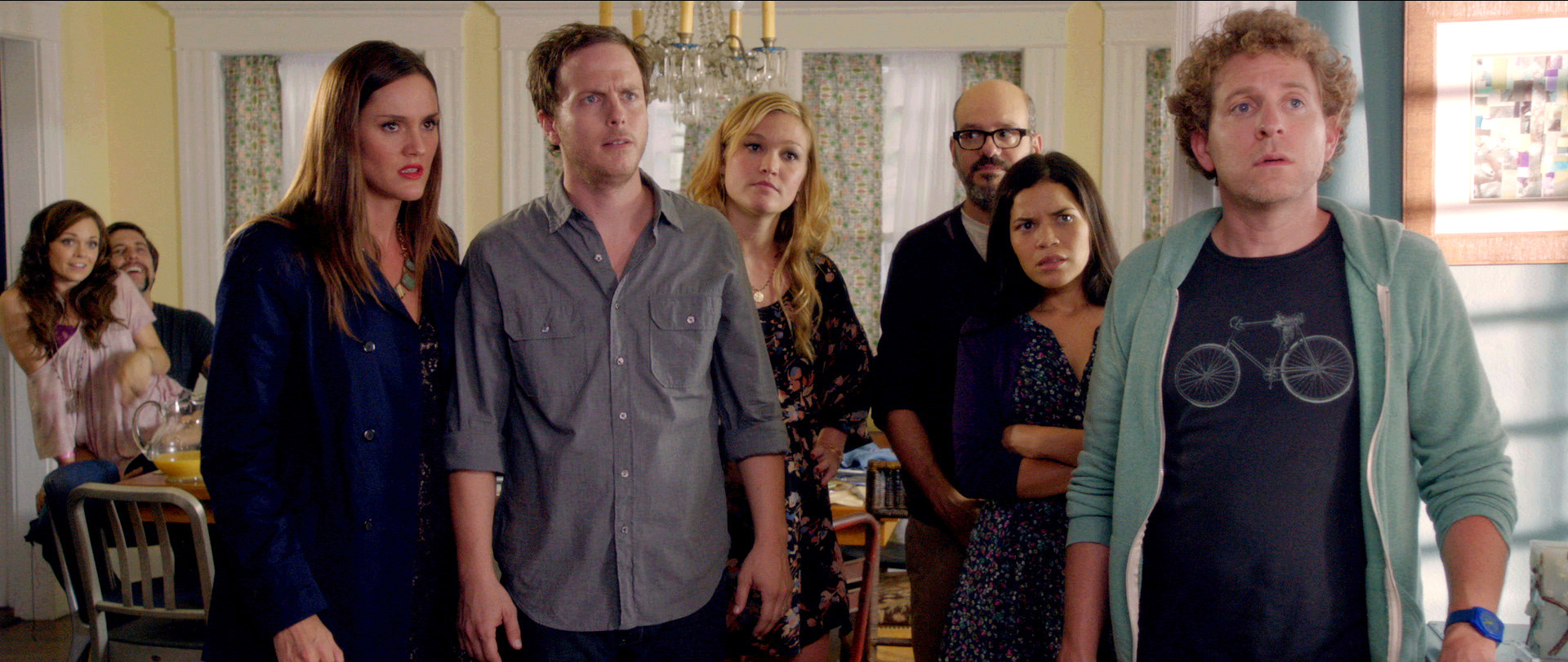On August 20, Jason Baldwin boarded a flight from Memphis to Seattle. He was 34 years old and had never been on an airplane. The farthest north he’d been was the Craighead County Jail in Jonesboro, in his home state of Arkansas. The farthest south was the Varner Unit in Grady, Arkansas; the farthest west was the Diagnostic Unit in Pine Bluff, Arkansas.
The geographical boundaries of his life had been prisons. In 1994, Baldwin, his best friend Damien Echols, and Jessie Misskelley, Jr. were convicted of murdering three 8-year-old boys the year before in one of the most sensational child-murder cases in U.S. history. Baldwin was 16 at the time.
Nearly 20 years later, the story of the West Memphis Three is familiar to the public, especially those who’ve seen Joe Berlinger and Bruce Sinofsky’s HBO documentary trilogy, Paradise Lost. The first film was largely responsible for raising awareness about the bizarre aspects of the trial that convicted the Three: Misskelley’s forced confession, leads not followed, the conclusion that Baldwin was involved in an insidious satanic cult with Echols because he owned black Metallica T-shirts. Johnny Depp, Natalie Maines, and Eddie Vedder subsequently got involved in the cause to “free the West Memphis Three.”
But even after advanced DNA testing failed to connect any of them to the crime, what freed Baldwin, Echols, and Misskelley wasn’t an overturn or any admission of a miscarriage of justice. Last fall, they used a complicated legal loophole called an Alford plea, in which they pleaded guilty to the crime while still personally maintaining their innocence. The Three were sentenced to the time they had already served, then released.
Finally free, they were still convicted felons. In one of the most poignant moments in the third Paradise Lost film, Purgatory (nominated for Best Documentary Feature in this year’s Academy Awards), Baldwin is shown in the courtroom, dressed in a suit and tie. “This was not justice,” he says calmly, but with a spark of fury in his eye. “In the beginning, we told nothing but the truth, that we were innocent, and they sent us to prison for the rest of our lives for it. And then we had to come here, and the only thing that the state would do for us was to say, ‘Hey, we’ll let you go only if you admit guilt.’ And that’s not justice, no matter how you look at it . . . I did not want to take the deal from the get-go. However, they’re trying to kill Damien.” (Echols had been sentenced to death; taking the Alford plea may have been the last shot at saving his life.)
“Sometimes you just gotta bite the gun to save somebody,” says Baldwin.
Now he and Echols were sitting across from each other on a jet, leaving West Memphis behind. “Before we got on, I said, ‘I’m either gonna be totally exhilarated by it and love it, or be terrifyingly frightened!’,” Baldwin remembers. “It was the ‘exhilarated.’ It was like taking off on a roller coaster. Damien was right in front of me, and he had the opposite reaction. I thought he was going to projectile all over me.”
Baldwin and his girlfriend, Holly Ballard, are eating lunch at Capitol Hill’s Café Presse on an uncharacteristically bright Thursday afternoon. He’s downing cups of black coffee, and when the waitress offers Baldwin a refill, he beams and says, “Always!”
Perusing the menu, Baldwin stops at the baguette with liver paté. “What’s paté?” he asks, and then wrinkles his nose at the answer: meat paste. “We used to have platters of fried chicken and liver when I was a kid,” he says. “I would just go hungry!” He orders a croque monsieur and is immediately delighted with it when the waitress sets it on the table. “It kind of looks like a pizza, but a sandwich pizza!”
Baldwin originally flew to Seattle for a three-day visit. He stayed at a friend’s beachfront house, went kayaking on the Sound, and learned to paddleboard. “I just looked over at Holly and said, ‘We gotta stay here,’ ” he says. “Every day that we’re here reinforces that. I’m thinking this Seattle rain stuff is a myth just to keep everyone at bay. It’s sunny today! I mean, beautiful weather!”
Baldwin wears a yellow American Eagle beanie, covering a receding hairline that starkly contrasts early photos of his 16-year-old self with a long, curly blond mullet (a hairstyle he swears he’ll never go back to). He speaks in a Southern drawl, thick as tar, and most of his words are exultant, as though he hasn’t yet gotten over the thrill of his new boundless world. Last night he and Ballard—who met in 2008, four years after she, an Arkansas native, began writing letters to him in prison—went to see Star Wars: Episode 1 in 3D. “I’ve seen Episode 1, but I saw it in prison and we just had this little bitty TV, and you watch it from a distance . . . So to see it on a giant screen is amazing!”
The influx of technology and media in 2012 is something of a culture shock compared to rural Arkansas in the early ’90s, but Baldwin’s taking it all in with characteristic zest. He says he partially knew what to expect from reading tech-savvy novels like The Girl With the Dragon Tattoo; he became an avid reader in prison. “I’m reading A Song of Ice and Fire, which is what HBO’s Game of Thrones is based on. It’s good. But it’s not as good as The Sword of Truth. That’s a different series. I’ve read it nine times. It’s a beautiful story, it’s a fantasy story, but what it is, is really a treatise on reason.” As for television, he loves Game of Thrones and AMC’s The Walking Dead: “What’s not to like? Zombies and apocalypse!”
Despite the cultural witch hunt that sent him to prison, he wasn’t scared off from being a Metallica fan. “I had an mp3 player, I jammed all summer while I was mowing lawns. I jammed on Metallica’s Death Magnetic, the Ramones, Bad Religion, Pearl Jam. Every time a Metallica album came out, I made certain I got it. I’m not gonna say specifically how, ’cause some of the people that helped me out are still there,” he says.
In 2003, when Metallica’s St. Anger came out, he was caught with his copy and spent 77 days in solitary confinement as punishment. Now he takes out his iPhone and flips through his iTunes playlist. “I’m free! There’s no asinine rules saying, ‘You can’t have music,’ ” he laughs. (Baldwin saw Metallica play three shows at San Francisco’s Fillmore in December at drummer Lars Ulrich’s invitation.)
He displays his screen, pointing at it like he’s an Apple salesman. “The cool thing about my iPhone is that it’s got this cool app called Shazam, so I’ll be listening to KEXP or 107.7 and I’ll hear a song that I like and Shazam it.” His favorite new discoveries are Young the Giant and the Yeah Yeah Yeahs. “I go on YouTube and watch all the YouTube videos. They’re freaking awesome.”
For the first time in his life, Baldwin is living on his own. He just rented his very first apartment, a one-bedroom with a balcony. “I’m gonna get me some things to grow tomatoes, peppers, onions, herbs, bay leaves,” he says.
He wants to get a cat, and already has a name picked out: Goliath. But for the past six months, a normal life’s been on hold while he’s traveled the world, promoting Purgatory as well as Lord of the Rings director Peter Jackson’s upcoming documentary, West of Memphis. Baldwin says he’s stopped trying to count how many trips he’s taken, including five or six jaunts to New York; the Sundance Film Festival in January; Berlin, to present Berlinger with a “Cinema for Peace” award; and the Academy Awards in Los Angeles last month. And he recently returned from Monterrey, Calif., where he attended an event for SAFE, an initiative to abolish the death penalty in that state, to hear his lawyer, John Philipsborn, give a speech.
“I met a couple young attorneys, and they were like, ‘You know, I was motivated to go to law school because of what happened to you guys,’ ” Baldwin says. “It was very humbling.”
Responses like that are part of what’s pushing Baldwin to the next phase of his life: community college. One of the first things he did in prison as a teenager was earn his GED, and through funds donated by WM3 supporters, he “got a little bit of a college” via Arkansas State University. Now, through a full scholarship from Pearl Jam’s Vitalogy Foundation, he’ll work toward his associate’s degree, and, he hopes, one day achieve his goal of becoming a law professor.
Studying law, says Baldwin, is “an opportunity for me to utilize what I’ve been through to help other people. I can take what I’ve been through and couple that with a good education to help other people going through what I went through. Save innocent people from suffering that.
“I know it’s not going to be easy,” he adds. “Just because I’ve been through 18 years of prison, they’re not going to just give it to me. I’m going to have to work for it. I’m going to have to earn it.”








